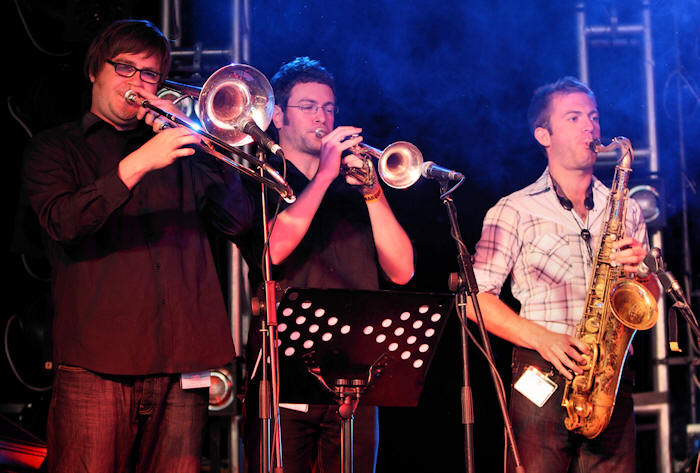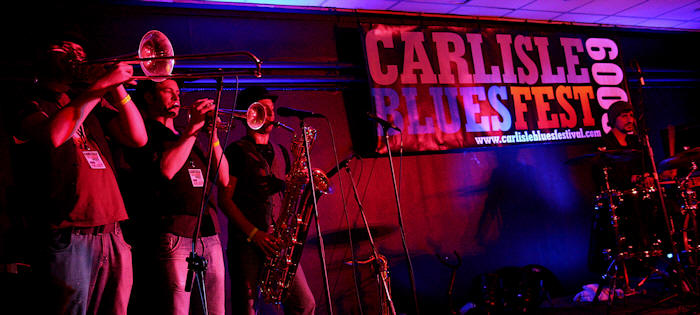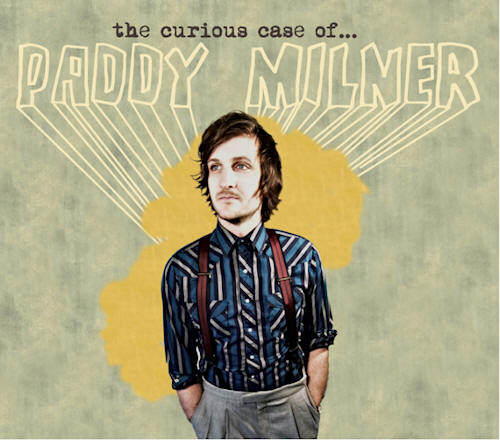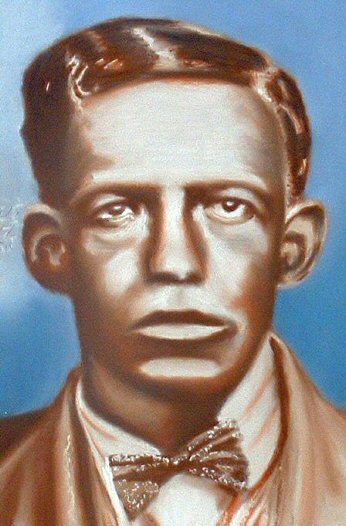
Painting © 2004 Loz
Arkle
Website
© Copyright 2000-2011 Alan White - All
Rights Reserved
Site optimised for Microsoft Internet Explorer
Early Blues Interview
|
|
"Paddy Milner is not only recognised as one of the leading blues
piano players in the world, but also as a songwriter whose influences
are as numerous as the number of notes he is capable of playing".
ďÖthe best blues piano player in Europe Ö imagine a Liszt meets
Professor LonghairĒ
ďImpressive & originalĒ
Paddy Milner and The Big Sounds
are: Paddy
Milner - Keyboards,
Scott Wiber -
Bass,
This interview was organised in conjunction with Nick Westgarth,
organiser of The Carlisle Blues Festival (www.carlislebluesfestival.com),
with thanks to Barbara Hood, Burnley Mechanics for facilitating the
interview. I met up with Paddy Milner and The Big Sounds during their tour with Earl Thomas, on an evening when Marcus Bonfanti was unable to be there. However if you check out the Interviews List you will find interviews with both Marcus Bonfanti and Earl Thomas held at previous events.
Paddy: Mainly going to folk festivals with my Dad, he was a Morris Dancer and I just remember going to all sorts of sessions at folk festivals along with lots of music in the house, Dad and his guitar, that sort of thing. It's always been there. Alan: Did you come from a musical family and did you always want to become a musician? Paddy: My Dadís like a Jack of all Trades and plays all sorts of instruments, none of them particularly well! [What?? - Laughter from the rest of the band!] Heís the first to admit it. I think Iíve just ended up being a musician even though at one point I went off to study physics at university. I didnít particularly want to be a scientist but I was interested in it but then I was gigging all the time and studying science didnít give me enough time to play music and I realised that was my true passion and where I wanted to dedicate my time. Alan: How and when did you get started in music? Paddy: I remember really enjoying playing the recorder in primary school. Oh yes, this is a true story of rock and roll! [More laughter from the band] Mum and Dad realised I enjoyed music and bought a piano for the house and got me on classical piano lessons which I didnít enjoy for the first two or three years and Iíd have preferred to be playing footy down the park. But then it was hearing some old blues records that Dad played at home one day, some Otis Brown and some John Mayall with some nice piano on it and it just caught my ear and from that moment on I just wanted to find out all I could about the music and spent all my time learning off records. Alan: You were classically trained on the piano from an early age, so what first attracted you to the blues, was it just listening to those records? Paddy: Just something about that sound that meant my ears perked up.
Paddy: It means a lot, I guess over a large part of my life when I was younger. I guess thereís the blues as in the music, the sound, and also the influence it had on my life. So it means playing loads of local gigs with local musicians down in Dorset. For me itís a folk music that represents something about the human spirit and itís not just about what somebody can do on the guitar or how many notes they can play. Alan: I read that since the age of 13 you've toured with visiting American blues artists. Tell me a little about them. Paddy: I did a lot of playing with Eugene Bridges when I was in my teens and early 20s, then I did a little stint with Big Joe Turner and learnt a hell of lot through that, not just about playing the piano but how the American musicians see the music and how they direct a band. Maybe learning the slight differences between American and European approaches to playing the blues. Alan: Your second album 'Walking on Eggshells' won accolades across Europe, gaining Dave Brubeck as a fan - tell me about the album and meeting Dave. Paddy: Yeah, recorded a version of 'Unsquare Dance' which is obviously his most well known tune. The publisher was sent a copy of the recording who passed it on to Dave Brubeck and he just had a really positive reaction to it and said some really nice things about it and it was arranged that when he came across to do his 80th birthday concert at the Barbican in London they arranged a meeting for me with him which was an amazing experience. He was the most amazingly humble guy, one of the most humble guys Iíve ever met, just really gentle, kind-hearted guy. No ego whatsoever and just really encouraging.
ďI love it Ė wouldnít change a noteĒ Ė Dave Brubeck Alan: Following the release of your third album 'Based on a True Story' you performed on the 'Legendary Rhythm & Blues Cruise. Tell me about the experience. Paddy: Done it a few times now, both in my own right and with Earl Thomas and The Big Sounds. Itís just a crazy time, basically a week long party centred around the blues. Some amazing bands on every trip. I think the best thing about it though is that, unlike a normal festival, everyone is within a small enclosed space for a whole week, so thereís loads of jamming and intermingling going on, especially at the pro-jam in the evening and you might find yourself on stage with some big names like Taj Mahal. Alan: You met Earl Thomas for the first time on the cruise. Paddy: Yes, met him the first day on one of the cruises and ended up jamming a lot in the evenings and hit it off. He needed a band when he came to the UK so we provided that for him. Alan: Are there any particular songs that you play that have special meaning to you? Paddy: Thatís a difficult one, although I guess they all do in different ways. Weíve played some of these songs a lot over the last few years and they bring back memories of different gigs, different times. Alan: Tell me about the 'Big Sounds' band, when did you all get together? Paddy: Oh, 5 or 6 years ago, originally to play the music that was the original incarnation of Walking On Eggshells. We all met in London in various ways, I met Ben at a jam session and we started talking about blues and then I needed a horn section for a particular gig and he put that together. Alan: Tell me about the making of your collaborative album with Earl, 'Earl Thomas with Paddy Milner & The Big Sounds'. Paddy: The gigs just worked so well with Earl and he just brought something to the band which perhaps we hadnít had, that really dynamic front-man and I think we provided something for him. These guys are an amazing group of musicians but also really positive on stage. The big bands are all about the music, as well as having a good time. Lots of interaction on stage which I think Earl particularly dug. So we decided to make a record. Alan: Tell me about the making of your new album 'The Curious Case of Paddy Milner', produced by yourself with several self penned numbers I believe.
Alan: You've recently toured with the legendary Jack Bruce - how was the experience? Paddy: Itís an ongoing thing, Iíve been doing bits and bobs with him over the last couple of years. Great experience, and Iíve never played with a louder bass player in my life. We met him at Ronnie Scott's Club where we run a regular monthly night and he was a guest. The first gig he blew up one of his amps and the first two or three nights of his tour he blew an amp up every night, that's pretty spectacular. Thatís living the dream! He really drives and directs the band from the bass guitar, which is pretty rare. Alan: You mentioned Ronnie Scott's, do you still do that monthly residency and how did that come about? Paddy: Yeah, itís a great night. It's normally sold out, or very busy, and we get some great guests down there. Originally I think the club wanted to put on a blues night and they asked around the scene and asked some individual players so it was kind of put together for the night but itís developed into a band in itself.
Alan: You have now embarked on a collaboration with Marcus Bonfanti. Paddy: Itís something weíve talked about for a while but we are going to try and put it together properly and do an album for release next summer, with Alex and Scott from The Big Sounds and probably some other guys involved. We have a lot of fun of stage and bring complimentary things to each other.
Ben: I was born in Essex but moved around loads because my Dadís a musician and lived in a lot of different places where he had work, either musical or regular work. Alan: Did you always want to become a musician? Ben: Perhaps partly, without knowing, yeah. I didnít start playing until reasonably late but always went to my Dadís gigs and he played with a lot of American country stars who would come over here and tour. So I grew up with country music and blue grass. Alan: You've played with and supported many artists and bands such as Dr John, Michael Bolton, Dizzee Rascal; What are your fondest musical memories? Ben: Probably the most memorable one was with Dr John. The horn section played with him on the legendary blues cruise when we were there with Earl. We sat in with him and they took a liking to us. Iíve always been a massive Dr John fan so knew all the music and they booked us for a gig in London and it was such a great opportunity, especially for me because I got to transcribe and take down all the original music from the old records. I loved them so much and I got to play them with him, and they were complimentary saying they hadnít heard them played like that for many years. It was great. Alan: How did the yodelling come about? [Laughter from the band] Ben: Man, youíve done your homework! As I mentioned I grew up with country music, and hated it throughout my childhood. My Dad did a lot of bluegrass and yodelling does feature in that music, in bluegrass, and trail songs and western swing. I left home and went to university to study jazz on the saxophone and as soon as I left home became obsessive about blue grass and country music and, err, yodelling. I taught myself to do it and my father and play together and yodel in harmony. Alan: Who do you admire and who has influenced you the most in your music? Ben: Probably my father a lot, and Dr John. Willie Nelson was massively influential to me and lots of jazz people like Sonny Rollins, Oscar Peterson. Many, many people of many different genres. I like music which is heartfelt for the right reasons so everyone who has ever done that has been an influence. Alan: Are there any particular songs that you play that have special meaning to you? Ben: Thereís a fantastic song called, Dad, Youíd Better Start Drinking, which is one I wrote!
Alex: I was born in Huddersfield, just down the road from here, and grew up there until I was about 8 or 9 then moved down south when my Dad got a job down there. Spent a lot of time coming back up here seeing my family. My Gran was a crazy Lebanese woman who had a tiny little house with a thousand people in there all the time and the fridge was full of food and she had very crazy music on all the time.
Alan: Was it a musical family and did you always want to become a
musician? Alan: Who do you admire and who has influenced you the most in your music? Alex: Err, Scott, the bass player. Paddy Milnerís not too bad .... seriously I go through fits and spurts. Some months Iíll be really into blues and then Iíll really love old funk music, itís one of my big things, and then the next month Iíll be into grime, core and rap. It changes every month and Iím often led by what rhythms I hear and what I like rhythmically as well as the song, the writing and the sound. Alan: Tell me about you teaching and writing product reviews for Drummer magazine. Alex: I donít do either of those things any more, although I do have a tuition page in Drummer which I suppose encompasses both. And right now Iím writing a series on the history of funk drumming which has got pretty deep. Iíve been doing it for nearly two years, that one single topic and itís getting a bit silly now. I think the subject might go on for ever and Iíll just keep writing about it until they stop me.
Scott: I was born in Pembroke, Ontario, Canada, just outside Ottawa and I grew up in Red Deer, Alberta, Canada, the other side of the country. Moved here when I was 23, which was 10 years ago. Alan: Was it a musical family you came from and did you always want to become a musician? Scott: My dad is a musician, as is his father, my grandfather. Itís in the blood somewhere and Iím not the first! I kind of got into music through heavy rock and heavy metal at high school and then when I graduated I had no idea what I wanted to do so I went and did a community college thing in my town in Red Deer, and flunked out. So I thought Iíd give music a go and it really stuck, itís the only thing that had really stuck with me I guess. Alan: You gained a diploma in Canada then a degree at Liverpool Institute for the Performing Arts (LIPA), tell me a little about your experiences there. Scott: Liverpool was cool. It was very different to what Iíd done in Canada which was much more like a kind of a jazz conservatory, like heavy academic study but LIPA was very much just led by the students and you could do what you wanted to. Well, there was a focus but not as heavy as the Conservatory style. It was great, thatís where I met Marcus and Randall and a lot of the people I still play with today, 10 years on. Alan: I believe you played with Sir Paul McCartney there? Scott: Yes, it was after the graduation ceremony. Myself, a drummer and a piano player got asked to play a little after-VIP cocktail thing and he walked in and we were playing, weíd just started Lady Is A Tramp and I just heard a voice, it was him. We all put our heads up and we all had our cameras behind us but we couldnít grab them as we were playing. Alan: I believe you were the bassist and musical director for Sandi Thom. Scott: I was until October 2010. I was with her for about 4 and a half years and it was good, a lot of fun and a lot of travelling. Alan: You've played with and supported many artists and bands such as Take That, George Michael, Boy George, Travis, Pink, Joe Cocker, Joe Bonamassa and B.B. King; what are your fondest musical memories of all those? Scott: All the shows like that were great. We were just in a support capacity but then you get to hand around and often meet a lot of those great people and get to see them do their thing. Canít beat it! Alan: Who do you admire and who has influenced you the most in your music? Scott: My parents have always been big supporters and without that kind of support I donít think Iíd have made it as far or been able to do it for as long. They are probably a very massive influence in my career. Alan: Are there any particular songs that you play that have special meaning to you? Scott: 'The Number of the Beast', by Iron Maiden. Iím not joking, I really like that! Maybe something by Kiss. Thereís been a lot of great songs and I guess it always means the most when youíre playing with the artist that wrote the material whether itís Paddy, Marcus or any of the other people Iíve played with, that's probably where I would find the most meaning.
Randall: Grew up on the south side of Chicago, Chicago Heights and spent my childhood years there. Then came over to this country about 12 years ago, over to Liverpool, obviously to the same place as Marcus and Scott, and Iíve been in London for about 9 years. Alan: Was it a musical family you came from? Randall: Not particularly. My fatherís side of the family was certainly into music and I remember as a kid getting together with these people from the south (Missouri, Tennessee area) and having a hootenanny. My grandfather would play the fiddle (not the violin, the fiddle) and Steve, my uncle, would play the piano and my Dad would grab the guitar and my other uncle would grab a guitar and theyíd sing. I played the spoons and eventually I graduated to large spoons. My Dad used to sing. I think he did some Frank Sinatra way back, but he doesn't do it any more. Alan: Did you always want to become a musician? Randall: I guess so. I remember when I was young playing in a garage band with some buddies of mine, we just wrote a couple of songs and started playing around for our high school buddies and for our second gig weíd booked out the local gymnasium of our church and paid off-duty police officers to be security and we brought in a PA and charged everybody a couple of bucks to get in and we all made like 50 bucks. I remember a couple of girls throwing their shirts on stage and I just thought, ďThis is it man! Iíve just made money, Iím paying off cops and women are throwing their clothes at me. Iím in!Ē Alan: You've played with and supported many artists such as Joe Cocker, B.B. King, John Mayall, Joe Bonamassa, Sandi Thom, David Gilmore, Buddy Guy, Earl Thomas, Paddy Milner; what are your fondest musical memories? Randall: BB King has always been a hero of mine, my folks were really into him, especially my father so that was a really special treat for me. Joe Cocker was pretty funny, you donít really meet him, he just floats in and floats out of gigs in his Mercedes. Itís all special, it's great music and great fun to still be doing it. Alan: Tell me about the recordings of your own songs; the artists, the commercials and television shows. Randall: Yeah, got a few and itís getting weirder and weirder. Somebody called me the other day and they said ďHey, have you done an ad for an Aberdeen dentist?Ē And I was, ďEmm, well, I may haveĒ and they said, ďPretty sure itís you!Ē Been doing a lot of stuff for television like Shameless, Hollyoaks and a couple of other British television programmes, Burger King commercial, other commercials here and there, still writing for artists, did some stuff for Sandi Thom, doing the Earl Thomas stuff, have a few other things which are good, so just trying to hack away at it with 'fingers in pies' as they say. Alan: I hear you do a lot of storytelling and teaching; how did that come about? Randall: I think songwriting is story telling. They certainly go hand in hand and thereís nothing better. We were in Denmark with Errol Garner and after the show we were having a couple of drinks and everybodyís telling stories. You know everybodyís got a story like the time we got arrested with Bob in the back of the van, the time we got stranded in Germany, everybodyís got stories on the road and itís kind of indicative for musicians to tell their stories. Meeting some of those older guys theyíve got some great stories so I donít particularly consider myself a story teller yet. A few more years and Iíll be able to spin a yarn or two. Alan: Who do you admire and who has influenced you the most in your music? Randall: I think anybody who is still doing it and still keeping the wolf from the door. In terms of guitar players, itíd be BB King, John Schofield, Hendrix and of course Stevie Ray. Iíve always been a big fan of the West Montgomery school, Charlie Christian, trying to play jazz, and I do mean the term 'trying'. Of late the stuff that Iím really digging ... well, itís kind of hard to say, thereís so much out there. Alan: Are there any particular songs that you play that have special meaning to you? Randall: The song Daylight which I wrote quite a few years ago and we just cut it with Earl Thomas with this album weíve recently done, that was quite a special song because itís a memory I had of childhood. My mum was taking a class for her Masters in downtown Chicago and she took me with her on Saturday and she let me loose on the campus (I was about 15) and I ended up going to the Brookfield Zoo and I remember hearing this bang-bang and I followed it and it turns out to be the lions. I didnít know this but every morning when the sun comes up lions in captivity just bay at the sun. And there were a lot of homeless people gathered there too having a bunch of drinks and having a good time and they were just howling back at the lions. Like I said before a lot of good songs are great stories and when you find certain songs that have a great impact itís hard not to feel attached.
Alan: Thank you Randall; we had better move on to Bob Dowell, freelance trombonist, arranger, orchestrator and educator. Bob, where were you born and where did you grow up? Bob: Iím from Barnet, north London.
Alan: Did you come from a musical family? Alan: Did you always want to become a musician? Bob: When I was young I realised I was the only person in the family who couldnít read music or play an instrument so I eventually ended up learning at school. The first concert I saw was Chris Barber and that kind of really got me inspired, the first time Iíd heard live instruments played properly.
Alan: You've also played with and supported many artists and bands
such as Dr. John, Jamie Cullum, Dizzee
Rascal, Sandi Thom, Todd Sharpville, the Coalminers, Earl
Thomas; Bob: Dr John was amazing. That was after Iíd met Earl, in 2008 I think we did a Blues Cruise and Dr John was on that boat so we ended up playing for him when he came over to London. That was like being in some kind of amazing live record, listening to it from an outside view point. It was great playing with Herman Earnest on drums, real guys from Louisiana who just sound amazing. Alan: I read that you are also an orchestrator. Bob: Iíve always been interested in arranging, at college we learnt how to arrange and write for a few horns or a load of strings and Iíve always been interested in that and transcribing records and finding out how Count Basie makes that sound or how Lalo Schifrin did Bullitt, or just how sounds work together. Alan: Who do you admire and who has influenced you the most in your music? Bob: I suppose I got into jazz as a trombone player so thatíll be the usual suspects of JJ Johnson and Jack Teagarden. They were the first I checked out and you can see the progression they have on each other in the lineage of jazz trombone players. But the first record I ever bought was Eddie Grant, Living on the Frontline. Then Motown, and Stax, and lots have interested me. Alan: Are there any particular songs that you play that have special meaning to you? Bob: This week Iíve been mainly sitting in my flat playing romantic trombone ballads. Iíve been playing If a Picture Paints a Thousand Words and A Time for Love.
Alan: Thank you Bob, and finally we have Jon Radford, freelance trumpet player, guitarist and recording engineer. Jon, where were you born and where did you grow up? Jon: I grew up in Peterborough and then escaped as soon as I could. The music scene was quite small when I was there (but it might be different now) and I went to college and then met most of the people in the band and decided to stay down in London.
Alan: Did you come from a musical family? Alan: Did you always want to become a musician? Jon: When I got to about 13 or 14 I started on piano lessons for a little while but that wasnít really for me so I took up the trumpet and started playing the guitar as well. I really got into rock music and especially Queen and it was then that I decided I wanted to do something with music as a career. That was a massive influence for quite a few years and then I explored rock music and at the same time got into big band music. The big band was my trumpet playing and the guitar was the rock side. Playing in big bands was a big part of my musical education.
Alan: Again, you've played and supported many artists such as Kate
Nash, Daniel Bedingfield, Jon: I played with Candi Staton last summer which was a great surprise. Thereís a couple of commercial hits that everybody knows from the radio and sheís getting on now, sheís a grandma, but she can really sing and sheís got a real blues element to her voice. She was a lovely lady as well and it was nice to be surprised. I thought it was going to be disco hits but she played older bluesy material and she can still do it. And the Dr John experience was just unbelievable, a real legend. Alan: I believe you've got a mobile recording business. Jon: Iím really into the music tech thing, and I teach it as well to A-level. Iíve always been into the whole process of recording and I find it just as enjoyable to record somebody else recording and try to capture that as I do performing myself. In my mind itís still a creative process but itís how well you can capture a vibe of a performance and try to keep it intact. If I had the facilities I would spend all my days in a studio somewhere fiddling around. Alan: Who do you admire and who has influenced you the most in your music? Jon: Bands like Queen were a massive influence but I went through every genre of music from heavy metal, thrash metal, jazz trumpet players like Freddie Hubbard, lots of big band trumpet players like Al Hurt and Doc Sevenson shaped me, and then the commercial players in Hollywood like Gerry Haye who did film scores and the Michael Jackson stuff. Alan: Are there any particular songs that you play that have special meaning to you? Jon: Nothing in particular that Iím playing at the moment. Thereís some stuff thatís out there that bands like Elbow have recorded that Iíve played at my wedding and have meanings that you can associate yourself with. Alan: Thank you Jon. Paddy and all the band, on behalf of Nick Westgarth and myself, many thanks for your time and we all look forward to seeing you again with Earl Thomas at Carlisle Blues Festival in November. _________________________________________________________________________
http://paddymilner.com/wordpress Check out Paddy Milner & The Big Sounds at the Carlisle Blues Festival 2011 Check out Interview with Earl Thomas Check out Interview with Marcus Bonfanti _________________________________________________________________________
Return to
Blues Interviews List |








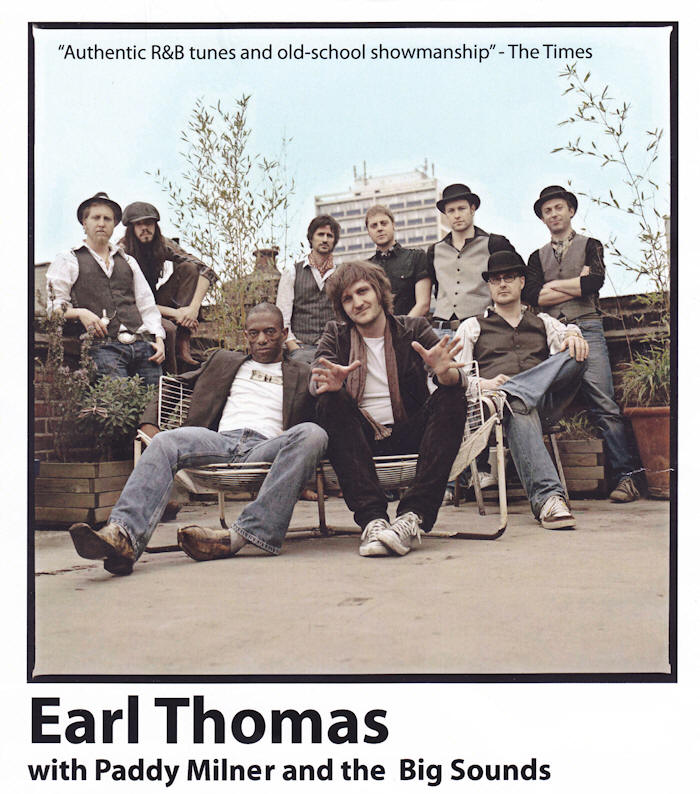
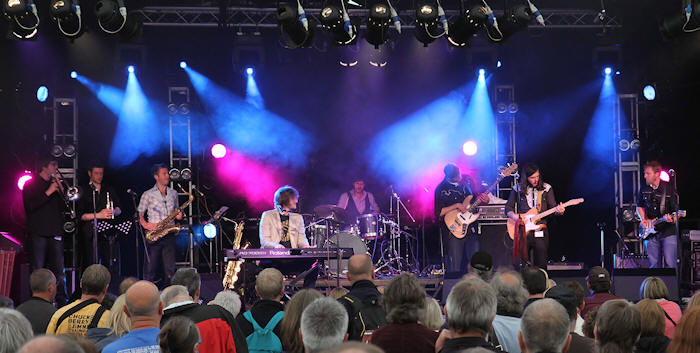
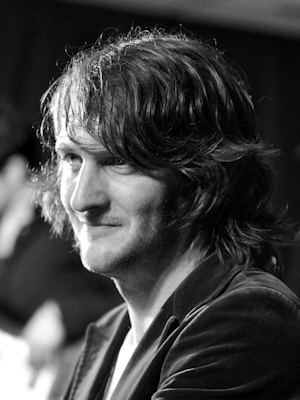 Alan: Paddy,
you were born in Edinburgh but spent most of your youth in Dorset. What
are your first musical memories?
Alan: Paddy,
you were born in Edinburgh but spent most of your youth in Dorset. What
are your first musical memories?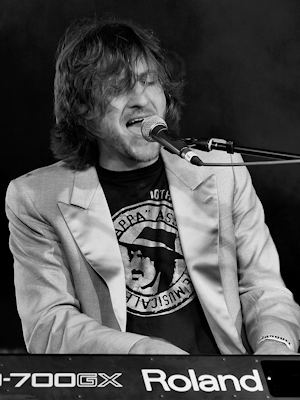 Alan: What does the blues mean to you?
Alan: What does the blues mean to you?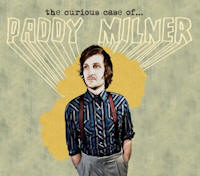 Paddy:
I wanted to do something a bit different with it, so itís broken down a
bit more. A lot of what I do in my solo stuff is centred around a
boogie influence, lots of busy left hand, and I wanted to reflect that
in a more modern kind of way. Originally the idea was to do it without
the big band and in particular without a bass instrument, to focus
around the percussion, not necessarily a drum kit but more a percussive
kind of thing. Alex Reeves and I working out different sounds and
working out different approaches and it grew from that.
Paddy:
I wanted to do something a bit different with it, so itís broken down a
bit more. A lot of what I do in my solo stuff is centred around a
boogie influence, lots of busy left hand, and I wanted to reflect that
in a more modern kind of way. Originally the idea was to do it without
the big band and in particular without a bass instrument, to focus
around the percussion, not necessarily a drum kit but more a percussive
kind of thing. Alex Reeves and I working out different sounds and
working out different approaches and it grew from that.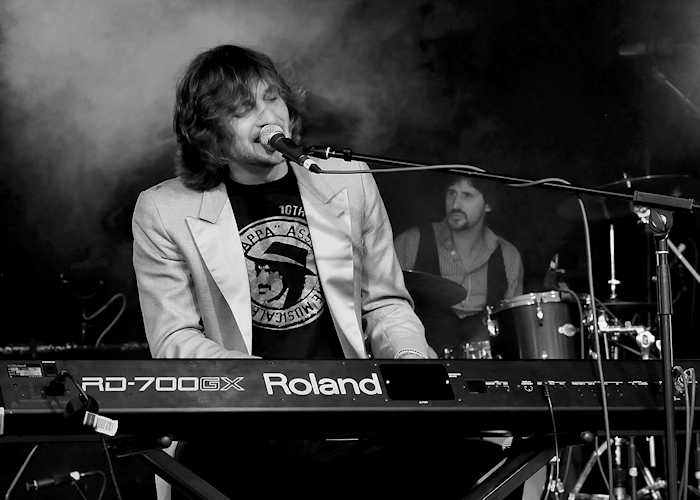
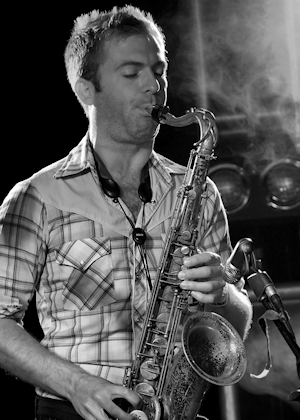 Alan: Thank you Paddy; moving on to
Ben Somers,
freelance musician playing saxophone, clarinet, flute, upright bass,
singer and yodeller. Ben, where were you born and where did you grow up?
Alan: Thank you Paddy; moving on to
Ben Somers,
freelance musician playing saxophone, clarinet, flute, upright bass,
singer and yodeller. Ben, where were you born and where did you grow up?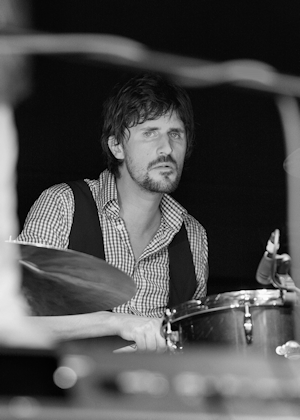 Alan: Thank you Ben; I'll now move on to
Alex Reeves,
freelance drummer, teacher and columnist for Drummer magazine. Alex,
where were you born and where did you grow up?
Alan: Thank you Ben; I'll now move on to
Alex Reeves,
freelance drummer, teacher and columnist for Drummer magazine. Alex,
where were you born and where did you grow up?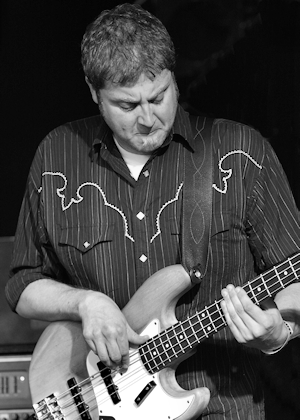 Alan: Thank you Alex; moving on to
Scott Wiber, freelance bassist and
musical director. Scott, where were you born and where did you grow up?
Alan: Thank you Alex; moving on to
Scott Wiber, freelance bassist and
musical director. Scott, where were you born and where did you grow up?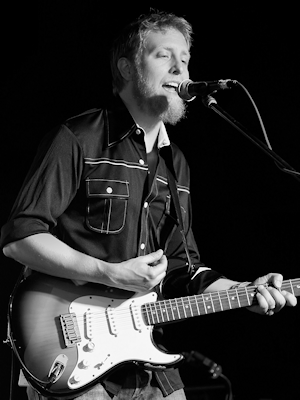 Alan: Thank you Scott, and now to
Randall Breneman, freelance guitarist,
songwriter, producer, storyteller and teacher. Randall, where were you
born and where did you grow up?
Alan: Thank you Scott, and now to
Randall Breneman, freelance guitarist,
songwriter, producer, storyteller and teacher. Randall, where were you
born and where did you grow up?